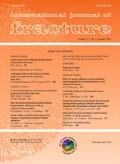During recent years, fracture mechanics has increasingly become a primary tool to ascertain, and additionally improve, the performance of mechanical components for different applications extending from the failure of metallic, ceramic and composite components, to the in-service operation of biological tissues. Techniques varying between experimental testing to numerical and analytical approaches reveal new insights into the foundations of material behavior, but also entail new challenges including capturing multiple scale interactions, from nano to macro-scale. Therefore, a complete assessment of structural integrity and material damage prediction requires a thorough combination of experimental, numerical and theoretical formulations.
This special issue of International Journal of Fracture constitutes a collection of contributions presented at the 36th Spanish Conference on Fracture (GEF2019), held in Seville, Spain, on April 3–5, 2019. The meeting was organized around 9 thematic sessions, covering most of the topics within Fracture Mechanics. All papers have been processed according to the normal reviewing standards of the Journal. The present volume constitutes a valuable snapshot of the field of fracture mechanics and a window to its many challenges and opportunities, accomplishments and open questions. It is specially to be desired that the volume will contribute to motivating the young research community interested in the field.
The Scientific program of the Conference included three plenary lectures, two devoted to academia (Prof. Leslie Banks-Sills from Tel-Aviv University and Prof. Dominique Leguillon from Sorbonne Université) and one devoted to industry (Mr. Rafael Ávila from AIRBUS Operations S.L). The local organization was undertaken by Prof. Luis Távara. The meeting gathered more than one hundred delegates, 28 of which were graduate students.
Finally, we would like to thank the Editor-in-Chief of International Journal of Fracture, Prof. K. Ravi-Chandar (University of Texas at Austin, USA) for his personal involvement in the present issue, and the editorial staff for their continuous support throughout the preparation of this special issue.
Luis Távara, Israel García, Pilar Ariza (Guest Editors)
Author information
Authors and Affiliations
Corresponding author
Rights and permissions
About this article
Cite this article
Távara, L., García, I.G. & Ariza, M.P. Preface. Int J Fract 223, 1 (2020). https://doi.org/10.1007/s10704-020-00436-4
Published:
Issue Date:
DOI: https://doi.org/10.1007/s10704-020-00436-4

